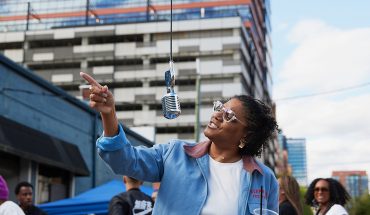by Kimberly Kyser
Southerners don’t write about manners; they live them. In Encyclopedia of Southern Culture, Charles Reagan Wilson writes that Southerners prefer to learn “proper behavior” from their mothers (and I would add fathers) and not from etiquette books. That is, we used to learn comportment at home. Today, too few have time for sit-down family dinners or teaching manners – and it shows.
I am frequently asked why I, a Southerner, wrote a book about table manners. Sometimes I throw my head back and laugh (politely) to say that I wrote Ticket instead of throwing a Southern hissy fit about what I see at the table. Living in North Carolina’s Research Triangle surrounded by thousands of college students, I learned quickly that streamlined table manners are no longer required by the culture, and they are certainly not in the curriculum. In fact, few students pay attention to table manners at all. Sadly, this is true on college campuses everywhere. Hostile body language, fist-holds of cutlery, stabbing with the fork, and crude sawing with the knife – these make up a savage style that has become the new norm. The university community is aware of the deficit, and on several occasions I have been asked to speak to students about table manners and appropriate dress. New hires and interns were showing up for board meetings in cutoff jeans and flip-flops! A young woman was not advanced to a position in development because she drank coffee with the spoon in the cup. (This small indiscretion screamed “no social skills!”) It was heartbreaking to watch highly intelligent, technologically skilled young people misrepresent themselves, especially since it takes so little time and effort to acquire this simple skill set. These training sessions working with students inspired me to write Ticket.
Table manners are a way to demonstrate thoughtfulness. Cleanliness, noiselessness, and bodily control demonstrate self-respect and consideration of others, still the foundation of all eating rules. Appearance – self-presentation – is significant, most notably in polite private and professional interactions. More importantly, knowing what to do when is liberating: we can relate to people, all kinds of people, directly without worrying about mechanics.
The late Dean Smith, legendary UNC basketball coach, knew all too well the importance of table manners and social skills in general. He called his friend Jenny Fitch, the inspiration and creator of Fearrington House Inn near Chapel Hill, to request a private tutorial for his team. He wanted his players to know about fine dining and manners when they traveled to other schools. The ever-gracious Jenny welcomed the young athletes who learned table manners that day. They gained confidence that extended beyond the basketball court and an important life lesson: Social skills improve grades, careers, and lives.
Enjoy it!
In mid-November last year I held the completed Ticket in my hand for the first time, only days before a book signing event at McIntyre’s Books in Fearrington Village, a much-respected independent book store owned by Keebe Fitch, Jenny’s daughter. It was also time for my annual home heating
system inspection. The doorbell chimed; I opened my front door to greet a burly 20-something man with an engaging smile, dazzling blue eyes, curly auburn beard, and floppy hair that peeked from beneath a frayed camouflage hunting cap. We exchanged greetings. I reminded him to cover his muddy work boots with booties before he came in. “Yes, ma’am. Got ’em right here. I’ll start in the attic and need the key to the basement.” When finished he paused as he handed me the basement key. “Is that a flat of books in the basement?”
I answered yes, that it was part of a flat and explained that I wrote the book. When he asked what it’s about I had one of my gulp-drum-roll moments: Oh, Lord, here it comes. He’s going to laugh. But he didn’t. When I said “table manners,” he hesitated and replied in all seriousness, “I think I need to read your book. I didn’t grow up with this stuff, and I think I need to know about it.”
“A lot of people didn’t grow up with it,” I reassured him. “Many people know nothing about even the most basic table manners, but they can learn. It’s not difficult. It just takes a little instruction and practice.”
Walking outside onto my front stoop into the fading sunlight to say goodbye, we continued our conversation. “I grew up poor in a trailer in Chatham County,” he said shyly. “I ate dinner on a Barcalounger in front of the TV.” Today, this gentle man has a place of his own, a girlfriend, but still no dinner table. Clients invite him to stay for dinner, but he feels uncomfortable accepting because he doesn’t know what to do at the table.
“Use a box or a wooden crate as a table,” I encouraged. “Do you have two chairs, any chairs table height? Practice the basics at home and enjoy it!” At this point I would have given him the book, but he confessed to not having read a book since high school – nothing except HVAC manuals, that is.
“Next spring when I come to check on your air conditioning, I’ll tell you about my progress with table manners,” he said with a big grin. Yet I hadn’t given this earnest young man, the perfect recipient, a copy. So I recently mailed one to him, with the hope that my book will be just the ticket!
Kimberly Kyser, a UNC-Chapel Hill graduate and Chapel Hill-based artist, designer, and writer, has worked as a clothing designer, interior designer, costume historian, magazine editor, and wardrobe consultant. Ticket: A Guidebook for the Table is her first book. Ticket is available at KimberlyKyser.com and in Chapel Hill at the Ackland Museum Store, Bull’s Head Bookshop, and Flyleaf Books. In Fearrington Village it is available at McIntyre’s Books and Dovecote.
Mind your manners
Do’s
Do turn off cell phones and other electronics, including cameras, before entering the dining room, and store them out of sight.
Do wait for the host’s signal to be seated, to begin eating, and to leave the table.
Do sit at the table with good posture, and minimize wiggling and gesturing.
Do ask for a replacement instead of reaching for cutlery that has fallen on the floor.
Do take small bites; eat slowly enough to carry on a conversation.
Do chew with your mouth closed.
Don’ts
Don’t ever move place cards so that you may sit with a friend or in a certain spot.
Don’t sit down in a restaurant until invited to do so by the host; stand until you are invited to sit.
Don’t drink coffee with the spoon in the cup or tea with the tea bag in the cup.
Don’t stuff your mouth with food and then try to talk.
Don’t wash down your food with wine or water.
Don’t blow on hot food to cool it down before taking a bite.
Book excerpt:
A few years ago while I was hard at work on this book project, I attended a trustee dinner at the University of North Carolina. During the soup course, I turned to my charming dinner partner on my left and introduced myself. We chatted about his work in the corporate world, his new employment at the Kenan-Flagler Business School, and his family. Then he asked me what I was working on (drum roll…gulp).
I don’t know what came over me because I just came out with it: I told him that I was writing a table manners book for students but really for all ages. He looked stricken and asked in the most vulnerable tone, “You’re not going to judge me, are you?” I laughed and said, “Of course not!” He then confessed that when he was in business school a course in table manners was required and the subject still made him nervous.
When the meat course arrived he noticed my injured hand and leaned toward me and whispered, “Would it be incorrect if I offered to cut your meat?” “Oh, thank you. That is so nice of you, but I don’t need help,” I replied, surprised by the intrusion but grateful for his kindness. I joked with him about it and assured him that it was no problem. After a few minutes the real answer to his question came to me. I leaned toward him speaking quietly, directly in his ear: “Never is a thoughtful gesture incorrect.”






